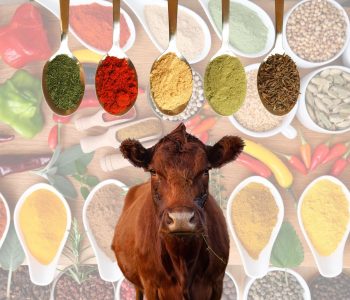Nutritional additives and their potential benefits in ruminant nutrition!
Summary
Nutritional additives are substances, microorganisms or formulated products, commonly used with the purpose of enhancing the quality of feed. These may be from a plant or animal origin. In ruminant nutrition, these are used to improve the productive properties and quality of different products. However, it must be taken into account that the impact of additives is related to the quality of the diet which is being supplied to the animal.
There are different classifications for additives used in ruminant feed. Amongst which there are: antibiotics, prebiotics, plant extracts and exogenous enzymes.
Main additives used in ruminant nutrition
Ionophores
The inclusion of ionophores as a feed additive in diets usually causes reductions in dry matter intake and milk production. However, it also generates an increase in body weight gain. These advantages are associated with an enhanced energy and protein metabolism, as well as an improved health status.
Yeasts
Currently there is a great demand for animal products from ecological sources. Therefore, many studies have been carried out with the aim of improving production levels and efficiency in systems where the use of yeasts stands out.
Research carried out in lactating dairy cows has revealed higher intake and increased dry matter digestibility when evaluating the effects of yeast supplementation. While also exhibiting higher volatile fatty acid concentrations and higher pH levels,
Fibrolytic enzymes
The most commonly used fibrolytic enzymes in ruminants are cellulases and xylanases. These can be incorporated in liquid or granular form in the total mixed ration or added separately in fodder and concentrated feed, as well as in supplements and mineral vitamin premixes .
| Supplementation with this type of additive has been shown to improve average daily gain, nutrient use and feed efficiency. |
Essential oils
During the last years the growing interest on the use of essential oils has been remarkable. Such great interest is related to their natural, complex and volatile compounds. These are synthesized from different plants through distillation with water vapor or through solvent extraction. They can be used as additives in ruminant nutrition, as they can modulate rumen environment similarly to what AGPs do.
Tannins
The use of tannins in ruminant diets emerged as a way to increase the efficiency of dietary nitrogen use. Today, tannins are used as an alternative method for rumen modulation. Having the added benefit of mitigating methane emissions, changing the biohydrogenation of polyunsaturated fatty acids.
To read the full study, download the attached PDF.
1 Graduate program in Animal Science at the Federal University of Bahia. Av. Adhemar de Barros. 500. Ondina. 40170-110. Salvador. Salvador Bay. Bahia. Brazil.
2 Postgraduate program in Animal Science at the Federal University of Maranhão. Rod. Br. 222. Km 04, S/N. 65500-000. High. Maranhao. Brazil.
3 federal university of sergipe. Department of Veterinary Medicine at Sertão. Av. September 26th. 1126 – New Hope. Our Lady of Glory. Sergipe Brazil.
Source: Journal of the Faculty of Agricultural Sciences. National University of Cuyo
